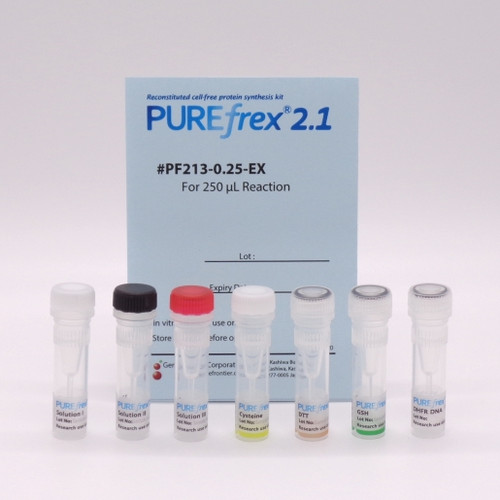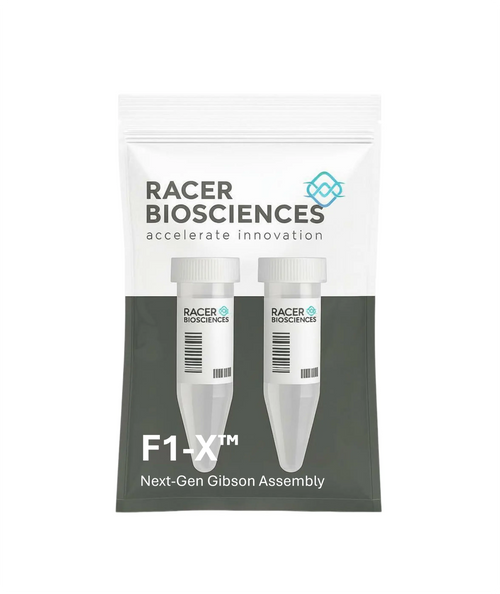
PUREfrex® 2.1 is the latest iteration of the PUREfrex® series reconstituted coupled transcription/translation system that now makes it possible for user control over reaction redox conditions to promote high-yield of functional disulfide bond-containing proteins. It also features reduced RNase, β-galactosidase and LPS contamination and boosted protein yield compared to PUREfrex® 1.0.
Formation of disulfide bond is an important process for folding and stability of extracellular and membrane proteins. Disulfide bonds are usually formed by oxidation of sulfhydryl groups (SH-) of adjacent cysteine residues. Thus, the efficiency of disulfide bond formation depends on redox state. Additionally, disulfide bond isomerase which catalyzes the exchange of disulfide bridges, may be required for correct cysteine pairing.
The redox state of PUREfrex® series reconstituted coupled transcription/translation reactions reflects the nature of the reducing agent and the ratio of reducing and oxidizing agents. The reducing agent in PUREfrex® 2.0(contained in Solution I) is DTT. By contrast, Solution I of PUREfrex® 2.1 contains neither a reducing agent nor cysteine, making it possible to tailor the redox environment to optimize synthesis of your protein of interest by utilizing provided independent solutions of cysteine, DTT and reduced glutathione (GSH). Other reducing agents such as 2-mercaptoethanol (not provided) may also be used.
PUREfrex® 2.1 enjoys the improvements incorporated into PUREfrex® 2.0, including upgraded purification processes and an optimized composition that together reduce RNase, β-galactosidase and LPS contamination and boost protein yield 2-10 times compared to PUREfrex® 1.0. All proteinaceous components of PUREfrex® 2.1 are free of fusion tags, allowing users the freedom to incorporate any chosen tag for protein purification/detection.
For proteins whose functional conformation requires the assistance of molecular chaperones or, for further assistance in formation of disulfide bonds, we offer supplemental reagents that work in conjunction withPUREfrex® 2.1.
Supplements – Chaperones –
These are supplements for PUREfrex® series reconstituted coupled transcription/translation systems to promote production and solubility of aggregation-prone proteins.
Supplements – Forming disulfide bonds –
These are supplements for PUREfrex® series reconstituted coupled transcription/translation systems to promote synthesis of functional proteins containing disulfide bonds.
| Documents & Links for PUREfrex 2.1 | |
| Manual | PUREfrex® 2.1 Instruction Manual |
| Flyer | PUREfrex 2.1 Flyer |
| Datasheet | PUREfrex 2.1 Datasheet (Size: 250ul Cat.No.:GFK-PF213-0.25-EX) |
| Datasheet | PUREfrex 2.1 Datasheet (Size: 250ul x 5 Cat.No.:GFK-PF213-0.25-5-EX) |
| Datasheet | PUREfrex 2.1 Product Insert (Size: 2ml Cat.No.:GFK-PF213-2ML-EX) |
| Datasheet | PUREfrex 2.1 Product Insert (Size: 2ml x 5 Cat.No.:GFK-PF213-10ML-EX) |
| Datasheet | PUREfrex 2.1 Datasheet (Size: 2ml x 25 Cat.No.:GFK-PF213-50ML-EX) |
| Documents & Links for PUREfrex 2.1 | |
| Manual | PUREfrex® 2.1 Instruction Manual |
| Flyer | PUREfrex 2.1 Flyer |
| Datasheet | PUREfrex 2.1 Datasheet (Size: 250ul Cat.No.:GFK-PF213-0.25-EX) |
| Datasheet | PUREfrex 2.1 Datasheet (Size: 250ul x 5 Cat.No.:GFK-PF213-0.25-5-EX) |
| Datasheet | PUREfrex 2.1 Product Insert (Size: 2ml Cat.No.:GFK-PF213-2ML-EX) |
| Datasheet | PUREfrex 2.1 Product Insert (Size: 2ml x 5 Cat.No.:GFK-PF213-10ML-EX) |
| Datasheet | PUREfrex 2.1 Datasheet (Size: 2ml x 25 Cat.No.:GFK-PF213-50ML-EX) |
| Citations for PUREfrex 2.1 – 18 Found |
| Bordeau, Valérie; Felden, Brice. Curli synthesis and biofilm formation in enteric bacteria are controlled by a dynamic small RNA module made up of a pseudoknot assisted by an RNA chaperone. Nucleic Acids Research. 2014;42(7):4682-96. PubMed - Comments: Demonstrates the benefits of PUREfrex over PURExpress |
| Terashima, Hiroyuki; Abe-Yoshizumi, Rei; Kojima, Seiji; Homma, Michio. Cell-free synthesis of the torque-generating membrane proteins, PomA and PomB, of the Na+-driven flagellar motor in Vibrio alginolyticus. Journal Of Biochemistry. 2008;144(5):635-42. PubMed - Comments: Demonstrates the benefits of PUREfrex over PURExpress |
| Maki, Kimika; Uno, Kanako; Morita, Teppei; Aiba, Hiroji. RNA, but not protein partners, is directly responsible for translational silencing by a bacterial Hfq-binding small RNA. Proceedings Of The National Academy Of Sciences Of The United States Of America. 2008;105(30):10332-7. PubMed - Comments: Demonstrates the benefits of PUREfrex over PURExpress |
| Handa, Yoshihiro; Inaho, Noriyuki; Nameki, Nobukazu. YaeJ is a novel ribosome-associated protein in Escherichia coli that can hydrolyze peptidyl-tRNA on stalled ribosomes. Nucleic Acids Research. 2011;39(5):1739-48. PubMed - Comments: Demonstrates the benefits of PUREfrex over PURExpress |
| Uchida, Ikuo; Ishihara, Ryoko; Tanaka, Kiyoshi; Hata, Eiji; Makino, Sou-Ichi; Kanno, Toru; Hatama, Shinichi; Kishima, Masato; Akiba, Masato; Watanabe, Atsushi; Kubota, Takayuki. Salmonella enterica serotype Typhimurium DT104 ArtA-dependent modification of pertussis toxin-sensitive G proteins in the presence of [32P]NAD. Microbiology (Reading, England). 2009;155(Pt 11):3710-3718. PubMed - Comments: Demonstrates the benefits of PUREfrex over PURExpress |
| Shimizu, Yoshihiro; Ueda, Takuya. SmpB triggers GTP hydrolysis of elongation factor Tu on ribosomes by compensating for the lack of codon-anticodon interaction during trans-translation initiation. The Journal Of Biological Chemistry. 2006;281(23):15987-96. PubMed - Comments: Demonstrates the benefits of PUREfrex over PURExpress |
| Yamamoto, Hayashi; Fukui, Kenji; Takahashi, Hisashi; Kitamura, Shingo; Shiota, Takuya; Terao, Kayoko; Uchida, Mayumi; Esaki, Masatoshi; Nishikawa, Shuh-ichi; Yoshihisa, Tohru; Yamano, Koji; Endo, Toshiya. Roles of Tom70 in import of presequence-containing mitochondrial proteins. The Journal Of Biological Chemistry. 2009;284(46):31635-46. PubMed - Comments: Demonstrates the benefits of PUREfrex over PURExpress |
| Asahara, Haruichi; Chong, Shaorong. In vitro genetic reconstruction of bacterial transcription initiation by coupled synthesis and detection of RNA polymerase holoenzyme. Nucleic Acids Research. 2010;38(13):e141. PubMed - Comments: Demonstrates the benefits of PUREfrex over PURExpress |
| Sharma, Cynthia M; Darfeuille, Fabien; Plantinga, Titia H; Vogel, Jörg. A small RNA regulates multiple ABC transporter mRNAs by targeting C/A-rich elements inside and upstream of ribosome-binding sites. Genes & Development. 2007;21(21):2804-17. PubMed - Comments: Demonstrates the benefits of PUREfrex over PURExpress |
| Narayan, Vikram; Halada, Petr; Hernychová, Lenka; Chong, Yuh Ping; Žáková, Jitka; Hupp, Ted R; Vojtesek, Borivoj; Ball, Kathryn L. A multiprotein binding interface in an intrinsically disordered region of the tumor suppressor protein interferon regulatory factor-1. The Journal Of Biological Chemistry. 2011;286(16):14291-303. PubMed - Comments: Demonstrates the benefits of PUREfrex over PURExpress |
| Yamano, Koji; Yatsukawa, Yoh-Ichi; Esaki, Masatoshi; Hobbs, Alyson E Aiken; Jensen, Robert E; Endo, Toshiya. Tom20 and Tom22 share the common signal recognition pathway in mitochondrial protein import. The Journal Of Biological Chemistry. 2008;283(7):3799-807. PubMed - Comments: Demonstrates the benefits of PUREfrex over PURExpress |
| Yamaguchi, Toshiya; Yoshinaga, Norifumi; Yazawa, Takashi; Gen, Koichiro; Kitano, Takeshi. Cortisol is involved in temperature-dependent sex determination in the Japanese flounder. Endocrinology. 2010;151(8):3900-8. PubMed - Comments: Demonstrates the benefits of PUREfrex over PURExpress |
| Vázquez-Laslop, Nora; Klepacki, Dorota; Mulhearn, Debbie C; Ramu, Haripriya; Krasnykh, Olga; Franzblau, Scott; Mankin, Alexander S. Role of antibiotic ligand in nascent peptide-dependent ribosome stalling. Proceedings Of The National Academy Of Sciences Of The United States Of America. 2011;108(26):10496-501. PubMed - Comments: Demonstrates the benefits of PUREfrex over PURExpress |
| Ullman, Christopher G; Frigotto, Laura; Cooley, R Neil. In vitro methods for peptide display and their applications. Briefings In Functional Genomics. 2011;10(3):125-34. PubMed - Comments: Demonstrates the benefits of PUREfrex over PURExpress |
| Fukushima, Keiko; Ikehara, Yukio; Yamashita, Katsuko. Functional role played by the glycosylphosphatidylinositol anchor glycan of CD48 in interleukin-18-induced interferon-gamma production. The Journal Of Biological Chemistry. 2005;280(18):18056-62. PubMed - Comments: Demonstrates the benefits of PUREfrex over PURExpress |
| Yano, Masato; Okano, Hirotaka J; Okano, Hideyuki. Involvement of Hu and heterogeneous nuclear ribonucleoprotein K in neuronal differentiation through p21 mRNA post-transcriptional regulation. The Journal Of Biological Chemistry. 2005;280(13):12690-9. PubMed - Comments: Demonstrates the benefits of PUREfrex over PURExpress |
| Bordeau, Valérie; Felden, Brice. Curli synthesis and biofilm formation in enteric bacteria are controlled by a dynamic small RNA module made up of a pseudoknot assisted by an RNA chaperone. Nucleic Acids Research. 2014;42(7):4682-96. PubMed - Comments: Demonstrates the benefits of PUREfrex over PURExpress |
| Blanken, Duco; van Nies, Pauline; Danelon, Christophe. Quantitative imaging of gene-expressing liposomes reveals rare favorable phenotypes. Physical Biology. 2019;16(4):045002. PubMed - Comments: Demonstrates the benefits of PUREfrex over PURExpress |







